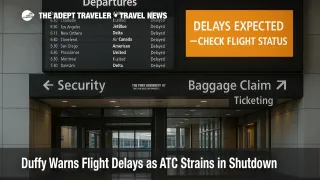Sec. Duffy Warns Flight Delays as ATC Strains in Shutdown

U.S. Transportation Secretary Sean Duffy said the Department of Transportation will "delay, [and] cancel" flights when necessary to protect safety as air traffic control staffing strains deepen during the federal government shutdown. He delivered the warning during Sunday interviews, adding that nearly half of major air traffic control facilities are short of personnel and that the picture could "get worse" if the stalemate lasts another one to two weeks.
FAA and hub impacts
Staffing shortfalls have already translated into operational constraints. On Sunday morning, Newark Liberty International Airport (EWR) cycled from a staffing-driven ground stop to a Ground Delay Program, with lengthy arrival and departure queues that spilled over to John F. Kennedy International Airport (JFK) and LaGuardia Airport (LGA). Local and national outlets reported average delays ranging from roughly 40 minutes to multi-hour peaks as metering took effect.
The FAA has acknowledged broad strain across the system, noting that controller call-outs and extended shifts around Halloween week stressed about half of the country's largest airports, with New York-area facilities among the hardest hit.
What Duffy said
Duffy emphasized that safety is the overriding constraint, stating he would slow or even "shutter" parts of the airspace if he believed risks were unacceptable. He also said the administration is trying to reallocate limited funds to critical operations, though there are hard limits without an enacted budget.
Pressed on the politics, Duffy defended the White House's position while blaming the opposition for leveraging the impasse. Regardless, his operational message to travelers was unambiguous, that delays and cancellations will be used as tools to reduce risk until staffing stabilizes.
Background
Air traffic controllers are designated essential, so they must report even during a shutdown, though pay can lapse after a specified period. Extended unpaid periods and overtime can drive fatigue, attrition risk, and increased sick calls, which in turn force the FAA to meter arrivals and departures through ground stops and delay programs. Those traffic management initiatives keep separation standards conservative, but they create longer taxi times, airborne holding, missed connections, and crew timeouts that cascade through the network. Recent episodes around New York show how quickly constraints at one hub can ripple to others.
Traveler strategy
If you are booked through congested hubs in the next two weeks, build in margin. Choose earlier flights in the day, avoid bank-to-bank connections under 90 minutes at New York-area airports, and watch for airline travel waivers that allow same-day or pre-departure changes at no fee. If you misconnect, ask the airline for endorsed rebooking on the next available flight or for a protected reroute via a less constrained hub. Check the FAA's real-time Operational Information System before leaving for the airport, and enable push alerts in your airline app for gate, time, and baggage-claim changes.
Final thoughts
The shutdown is injecting operational friction into already tight schedules. Until staffing stabilizes, expect precautionary metering at the busiest facilities and plan connections accordingly. Duffy's message was clear, that safety will drive deliberate slowdowns when needed.
Sources
- 'We will delay, we will cancel' flights to make sure people are safe: Duffy on ATC issues
- 'This Week' transcript 11-02-25: Transportation Secretary Sean Duffy
- Transcript: Transportation Secretary Sean Duffy on Face the Nation, Nov. 2, 2025
- Duffy says he would shutter U.S. airspace if he thought it was unsafe
- NYC warns of hourslong delays at Newark amid staffing shortages
- Staffing issues trigger ground stop at Newark Liberty International Airport
- Newark Airport issues ground stop amid staffing issues, second time in a week
- Flight delays soar amid FAA staffing shortages
